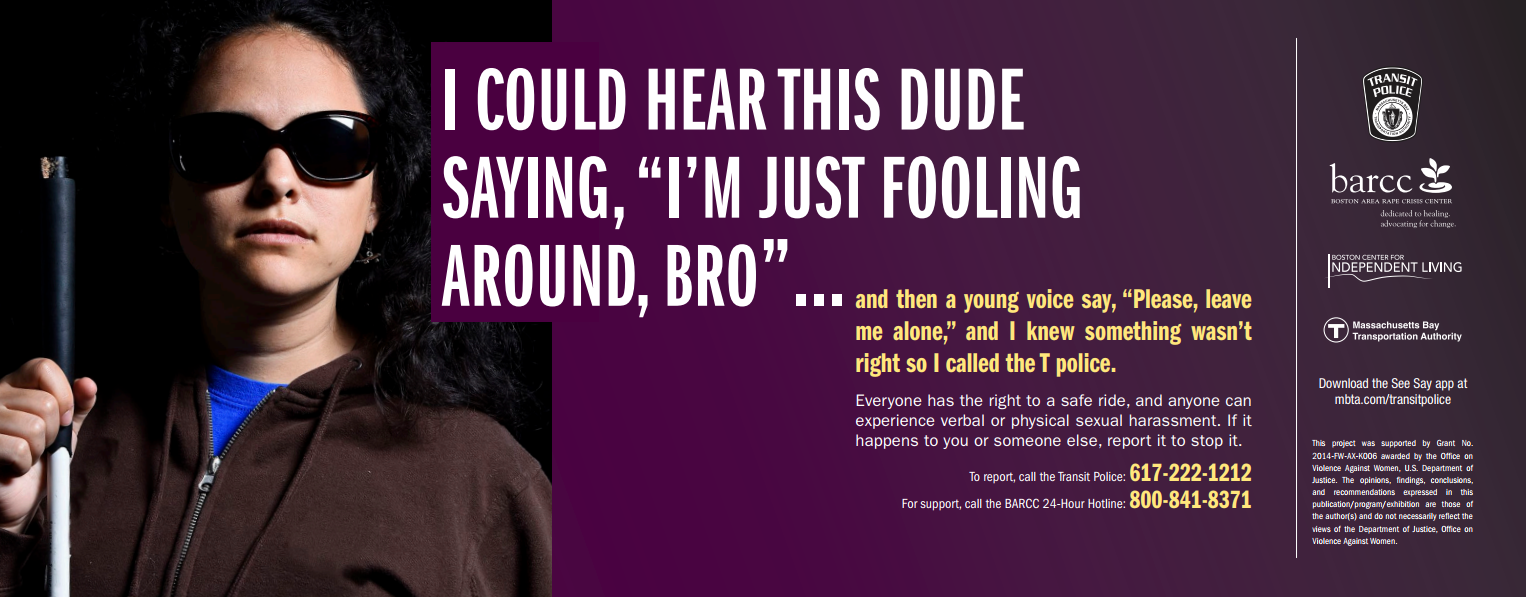News
BARCC, MBTA, and Partners Launch New Anti-Sexual Harassment Campaign
For Immediate Release
MBTA: MassDOT Press Office: 857-368-8500
Boston Area Rape Crisis Center: media@barcc.org, 617-649-1288
Boston Center for Independent Living: Karen Schneiderman, kschneiderman@bostoncil.org, 617-338-6665
Boston, Mass.—The MBTA, as part of a coalition of organizations, today launched a new information campaign to enhance passenger safety and encourage the public to report incidents of sexual harassment. The campaign’s message is that sexual assaults will not be tolerated on the T or anywhere else.
This year, the MASS Collaboration, a partnership with the Boston Center for Independent Living (BCIL), the Boston Area Rape Crisis Center (BARCC), the MBTA, and the MBTA Transit Police, developed the campaign with a focus on people with disabilities. MASS—Movement for Access, Safety & Survivors—is a collaboration whose goal is to insure that survivors and victims of sexual violence with disabilities in the Boston area have access to quality support services.
“The MBTA is proud to continue its groundbreaking campaign to address sexual harassment and to let the community of riders know that the MBTA cares that each rider has a safe ride,” said MBTA General Manager Brian Shortsleeve.
“One person victimized is one too many, and we are keenly aware that sexual harassment and assault are under-reported crimes,” said MBTA Transit Police Chief Kenneth Green. “We implore our riders to contact us if they see or experience any type of sexual assault. Be assured we take these reports with the utmost seriousness, and you will be treated with dignity and respect throughout the reporting and investigatory process. You are not alone—BARCC and the TPD stand with you."
“Findings show that people with disabilities experience sexual assault twice as often as those without disabilities. We have also been learning how people with disabilities can be active participants in preventing sexual violence against others,” said BCIL senior advocacy specialist Karen Schneiderman.
Boston’s public transportation system is one of the oldest in the country and is widely used by people with disabilities. MASS Collaboration works to create a safe environment for all customers, one that includes the needs of people with disabilities, including ensuring that reporting and response mechanisms are accessible. The MASS Collaboration is also increasing the skill and comfort of employees at BARCC, BCIL and the MBTA with respect to working with victims/survivors with disabilities. Efforts at the T have included developing information and trainings on topics such as responding to reports of sexual violence from those with disabilities, and how to secure wheeled mobility devices in a manner that is safe and empowering to customers.
As in past campaigns, advertisements will be posted on trains and buses, and postcards will be handed out to riders at several stations. Postcards will be available in large print and the MASS Collaboration has also created an online website to make the information accessible to those who are blind or have low vision: www.mbta.com/stopharassment.
“By increasing visibility of an under-addressed issue, we hope to let all riders know that you can make a difference if you intervene when you witness sexual violence. Accessible services are available at BARCC for survivors and those supporting and assisting them,” said Shelley Yen-Ewert, director of the MASS Collaboration [and BARCC's director of organizational development and learning].
I could hear this dude saying, "I'm just fooling around, bro" . . . and then a young voice say, "Please, leave me alone," and I knew something wasn't right so I called the T police.
The car was packed and he couldn't maneuver his wheelchair too well. I knew he couldn't get away . . . from the woman harassing him so I squeezed between them and texted the T police.
I could tell the way she was looking at me she wanted me . . . to back her up. So, I told the guy harassing her to leave her alone and sent his photo to the T police.
I could tell she wasn't sure what to do . . . but I could see he was rubbing up against her. So we got off at the next stop and called the T police.
Everyone has the right to a safe ride, and anyone can experience verbal or physical sexual harassment. If it happens to you or someone else, report it to stop it. To report, call the Transit Police: 617-222-1212. For support, call BARCC's 24-hour hotline: 800-841-8371.



